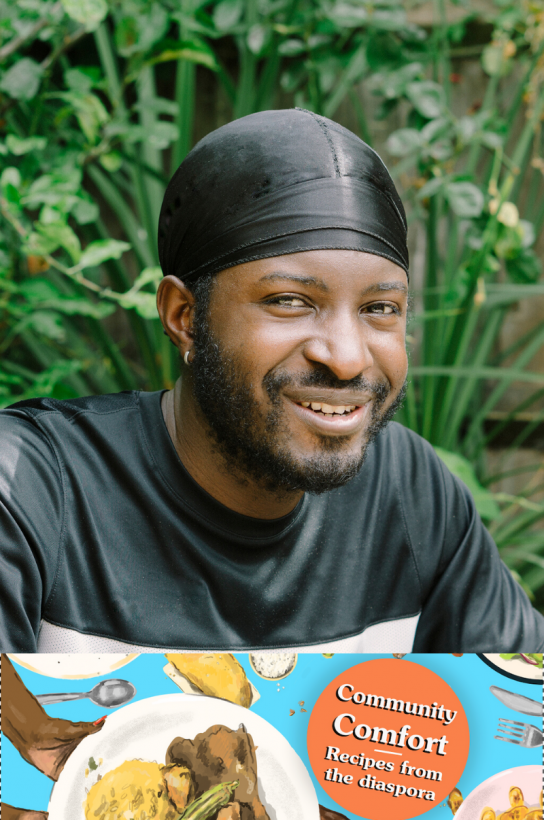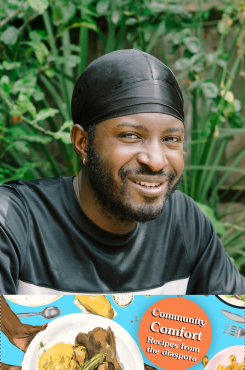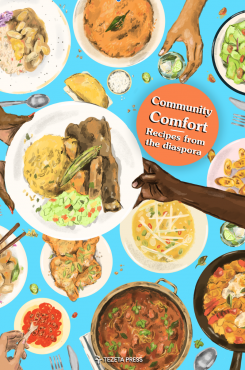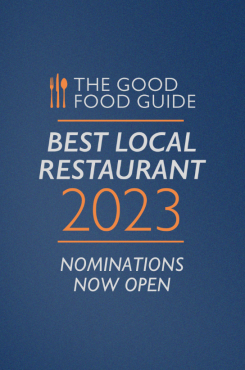Raising £20,000 in just two days to support Black and Ethnic Minority communities impacted by COVID-19, Community Comfort brings together over 100 recipes from stars of the diverse UK hospitality industry.
This week, we spoke to Riaz Phillips, founder of publishing house dedicated to under-presented ideas Tezeta Press and author of Belly Full, about the inspiration behind the book, what recipes readers can expect and promoting diverse voices in the industry.
What inspired the idea behind Community Comfort?
Around the end of May, news started to break about the effect coronavirus was having particularly on Black and Asian communities. People in those communities were more likely to contract and die from the virus, and it was really depressing, and I felt helpless. A lot of other people have been feeling the same way.
What is Community Comfort for those who don’t know?
Through isolation and lockdown, myself and a lot of people have been turning to comfort food. People were cooking more at home, in particular foods from their own heritage. One day I was reading the New York times, and I saw an article about Old Community cookbooks, and I thought that was a really cool idea to bring all these different ideas into something that could help out.
I knew that if these recipes and foods were doing something for us, they’d be doing something for people outside of those communities as well. I asked loads of chefs and cooks, a lot of whom I have followed or met over the years, to submit comfort food recipes. I didn’t dictate what they should cook, or even what type of thing they should cook, I just told them to pick what they turn to!
What kind of recipes can readers expect?
There is all sorts, from early morning breakfast meals, all the way to curries inspired by Caribbean, West African and Southeast Asian heritage. There’s a variety of soups and stews, there’s a chapter on bites inspired by a lot of people’s relationship to their own street food, such as patties from the Caribbean and empanadas from Latin America. Then, of course, there’s a sweet section as well: that’s less predicated on heritage than some of the earlier chapters, but you see a lot of it interwoven in there, like Yvonne Maxwell’s roasted plantain and ice cream recipe, as well as vegan cakes and salted ginger caramel chocolate cake from Benjamina Ebuehi.
There’s over 100 recipes so the diversity is huge! I didn’t want it all to be specifically heritage cooking, I also wanted to display diversity in cuisine in general and show that people from diverse backgrounds aren’t only interested in cooking their own heritage food, but they can do so much more given the opportunity.
Would you be able to pick a favourite recipe if you had to?
Yes! My mum’s one. I’m being bias, but…
Can you tell us a bit about your partnership with The Majonzi fund?
I’m raising the money and donating it to them. I picked them because there was hardly anything I had seen that was looking to support the communities being the most affected by coronavirus: there wasn’t many funds or initiatives, or anything designated to help these people. Thew few all-encompassing things I did see were very short term, like bursaries, food banks.
I wanted to look at the long-term effect we can’t really see yet, because we’re still in it. A lot of people have been through losing loved ones, including some of the chefs in the book, and they’re living through that trauma as we speak. So, I thought what The Majonzi Fund were doing was particularly amazing, because it has dealt with the back end of having access to therapy, dealing with PTSD, affording memorial services, plaques and any remembrance initiatives, and that really spoke to me.
I saw you raised £20,000 in the first two days. Were you expecting that level of support?
I don’t want to seem like I’m not excited, I really am… but we’re still so in it for me. A lot of people are returning to normal and everyone has their own way of dealing with things, so I won’t critique how they choose to deal with things, but for me we’re still very much in it so it’s hard for me to be elated. But there has been a good response.
There’s also the underlying element of hoping to broaden the horizons of who is represented in British food and having food in people’s repertoire that they have eaten for decades. I really wanted to expand awareness of those foods. Not only will it help the chefs that cook them, but also spur bigger interest in a lot of the local shops that sell those foods as well.
Do you think there has been a change in people recognising diverse voices in food and beginning to educate themselves?
I’ve seen a change, but it remains to be seen whether that will be a lasting change. Only time will tell!
To purchase Community Comfort for a minimum donation of £10, please visit the website here
For more industry insights, subscribe to the CODE Quarterly here
(Photo credit: Kindima Bah)



